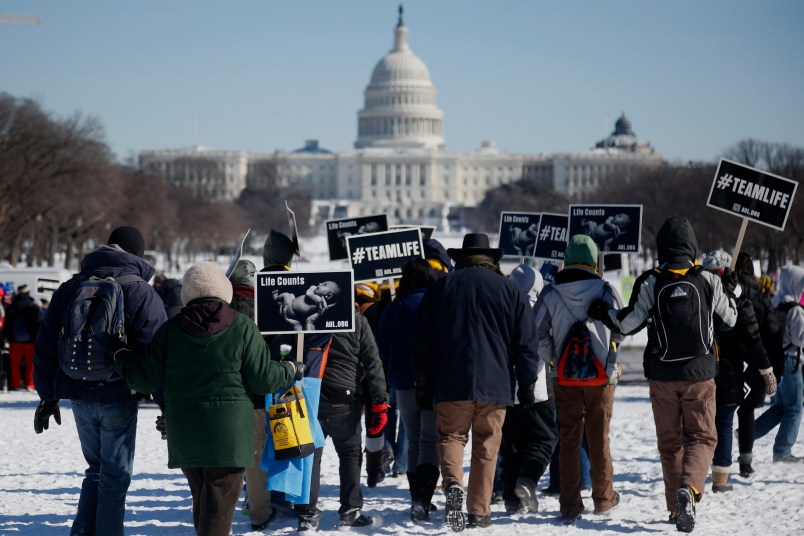CINCINNATI (AP) — A national anti-abortion group wants a federal court to block an Ohio law barring people from knowingly or recklessly making false statements about candidates seeking elective office.
The Susan B. Anthony List filed a motion Friday in U.S. District Court in Cincinnati, asking that the law not be enforced while the group continues to challenge its constitutionality. The motion says the statute violates free speech rights and “chills core political speech.”
The U.S. Supreme Court ruled unanimously Monday that the group could challenge the law, raising doubts about whether Ohio’s law and similar ones in other states can survive complaints that they violate free speech rights.
The anti-abortion group challenged Ohio’s ban when it tried to post billboards attacking then-U.S. Rep. Steve Driehaus in 2010. The planned ads accused him of supporting taxpayer-funded abortion with his vote for President Barack Obama’s health care law. Driehaus filed a formal complaint with the Ohio Elections Commission, saying the ads misrepresented the facts and violated Ohio’s false speech law. The billboard owner feared threatened legal action by Driehaus and declined to post the ads. Driehaus dropped the case after losing his re-election bid.
When the Susan B. Anthony List challenged the law’s constitutionality, a federal judge said the group didn’t have the right to sue because the case had been dropped and the group hadn’t suffered actual harm. An appeals court agreed.
The Supreme Court didn’t rule on the Ohio law’s constitutionality but sent the case back to the lower court to consider the question.
The anti-abortion group during the 2014 midterm elections plans to criticize members of Congress who voted for the health care law. The group maintains that its statement about the health care law allowing for taxpayer-funded abortion is true, group spokeswoman Mallory Quigley said Saturday. The Obama administration has steadfastly denied that.
“If granted, this injunction will allow us to continue our efforts to inform voters without fear of prosecution,” Marjorie Dannenfelser, president of the Susan B. Anthony List, said in a statement on the group’s website.
DeWine spokesman Dan Tierney said Saturday that the attorney general’s office will defend the constitutionality of the Ohio law. But he also said that DeWine will continue to make the courts aware of his significant First Amendment concerns on the issue.
Copyright 2014 The Associated Press. All rights reserved. This material may not be published, broadcast, rewritten or redistributed.







Now that corporations are people and they and the rich can buy politicians, once lying about anything you want to any venue you want to becomes the law of the land I would think we can disband the Supreme Court and sit back and watch some form of Helter Skelter far different than the one Charles Manson envisioned begin.
Anti-abortion/anti-contraception extremist zealots want to be able to lie and get away with it. What a surprise.
Nothing new and we all can guess how the Roberts court will rule.
“I always distrust people who know so much about what God wants them to do to their fellows.”
-The real Susan B. Anthony
This whole issue would warm Joseph Goebbles heart, he would be 100% behind these people. Because he is the one who said, “If you tell a lie big enough and keep repeating it, people will eventually come to believe it. The lie can be maintained only for such time as the (fill in the blank, Koch brothers, Tea Party, S.B. Anthony, GOP, even Cheney) can shield the people from the political, economic and/or military consequences of the lie. It thus becomes vitally important for the State to use all of its powers to repress dissent, for the truth is the mortal enemy of the lie, and thus by extension, the truth is the greatest enemy of (fill in the blank, Koch brothers, Tea Party, S.B. Anthony, GOP, even Cheney, oh and I forgot Fox News.”
Of course they would all say that it is Obama that is lying but when did Obama insist that the government regulate women’s bodies, or deny food to children, or look for ways to send our military in to cause death and destruction for the good of the Cheneys and Halliburton. That the Koch brothers only want what is best for themselves and their freedoms to the tune of billions of dollars spent to take over our freedoms and government.
But of course now that the corporations are people they should be able to tell as many lies as the people can swallow, no consequences should be allowed.